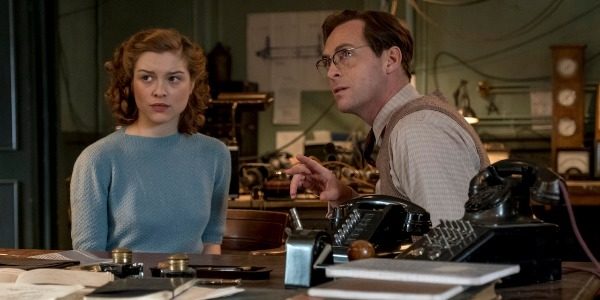During the 1930’s, five Cambridge University graduates were recruited by Soviet intelligence, and as they climbed the career ladder in the British government while the Second World War unfolded, they continued to pass a significant number of state secrets to an increasingly antagonistic foreign power. The “Cambridge Five” are fascinating primarily due to how mundane they are – there’s a reason that they weren’t discovered for many decades, after all.
There are numerous literary thrillers that are inspired by this passage of history, even if the reality is far less menacing. They were never prosecuted for sharing state secrets, and only ever agreed to enter into the world of espionage due to the belief that communism was the only political force that could destroy the omnipresent fascism on the continent.
None of the Intrigue of the real life inspiration
Roughly 50 miles away in London, Melita Norwood became a member of the Woolwich Spy Ring, passing secrets to the KGB while hidden in plain sight of her role as a civil servant. Astoundingly, it was many years after retirement when she was discovered – in documents revealed in 1999 by a former KGB archivist, with further archive files released in 2014 stating that the KGB thought she was the greatest British spy they had ever recruited.

Red Joan, director Trevor Nunn’s adaptation of Jennie Rooney’s 2014 novel of the same name, combines the broad historical details of these two intriguing homegrown spy stories, and left me wishing I was watching a biopic of the real Melita Norwood instead. Nunn’s film wants to leave its titular character as uncomplicated as possible, reducing her relationship with a hostile foreign power as a mark of sheer naivety, so desperate for her to remain an empathetic figure in the eyes of the broadest conceivable audience. The intrigue of the real life inspiration has been reduced to melodramatic tedium.
Opening sometime in the early 21st century, the elderly Joan (Judi Dench) is arrested and taken into police questioning due to accusations of treason dating back to the second world war. We then flash back to the pre-war era, when young Joan (Sophie Cookson) is a student at Cambridge University, and falls in with the communist crowd, slowly falling for Jewish Russian immigrant Leo (Tom Hughes) as she attends his secret screenings of Battleship Potemkin. After graduating, she gets a job working on a top secret research project for the Government, but her university associates sympathetic to Stalin coax her into passing on British state secrets to the KGB. Joan is never fully on board with the communist cause, and only agrees to pass the information on due to the naive assumption that if both sides know how to build the bomb, there’d be an innate deterrent against using it.
An Uncomplicated Protagonist
On paper, this characteristic offers the potential to subvert the narrative expectations of a spy thriller. For all the talk within the film of nobody expecting a woman to be responsible for leaking classified documents, the same approach isn’t handed to an exploration of Joan’s own political identity during this period, which seems defined by an impartiality towards everything but the looming threat of fascism she is very naturally against. Yet in the modern day scenes, Nunn mines laughs from Joan stating an impartiality while in a house filled with left-wing memorabilia, telling her son that she had no affiliation to those causes while serving him tea from a Che Guevara mug.
In the film’s view, her political awakening appeared to take place many years after she was directly involved with spying for a foreign power, a detail that goes unremarked upon due to the lack of synergy between the 20th and 21st century sequences, and the desire to not add any complications to a character the film wants to make as empathetic as possible.
Her motivations are not entirely dissimilar from those of the Cambridge Five, who merely wanted to help strengthen a political cause that they thought could defeat the increasing Nazism on the continent – misguided actions that are somewhat noble when justified in this manner. But there’s an odd simplification (if not an entire depoliticisation) of the beliefs here, more comfortable attributing the actions as a ramification of falling in love with a Russian immigrant than it is to probe any deeper questions. Heaven forbid, in times as politically turbulent as the one we currently live in, that a film dare go beneath the surface in its exploration of an inherently political subject.
Red Joan is, naturally, aiming for the “grey pound”; the same elderly British audiences who turned The Best Exotic Marigold Hotel into an unlikely blockbuster franchise. But as many older Brits lean conservative, they’ve stripped the film of any palpable political tensions so they can still be presented with a character who (in theory) is empathetic, doing the wrong thing for a reason the film bends over backwards justifying as noble.
Red Joan: Conclusion
Red Joan is suffocatingly mediocre, a political thriller with a bizarre disinterest in the inherent politics of the story, or anything that could be considered remotely thrilling. A straightforward adaptation of the real life story of Melita Norwood, who unequivocally declared sympathy for communist causes, would make for a more intriguing case study – and definitely one that wouldn’t dream of softening its edges to gauge audience sympathies.
Red Joan is released in the UK on April 19. All international release dates are here.
Does content like this matter to you?
Become a Member and support film journalism. Unlock access to all of Film Inquiry`s great articles. Join a community of like-minded readers who are passionate about cinema - get access to our private members Network, give back to independent filmmakers, and more.